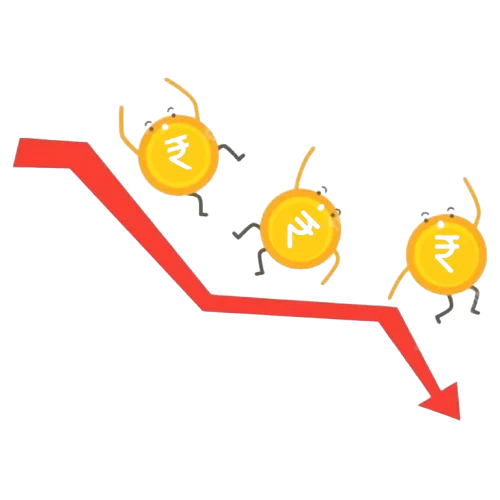SEBI Registered Investment Advisor | RIA No.-INA000017222
Need Financial Clarity?
Use the search bar to explore trusted financial insights
SEBI Registered Investment Advisor | RIA No.-INA000017222
Use the search bar to explore trusted financial insights
Inflation is the rate of increase in prices over a given period of time.
The inflation calculator helps you calculate the future value of money based on the Inflation rate.
Step 1
Input the present value / current cost you want to track.
Step 2
Select how many years into the future you want to project the value of your money or expense.
Step 3
Choose the inflation rate (you can adjust the default setting based on your assumptions).
Step 4
Instantly calculate the future cost/ value, i.e., how inflation affects your purchasing power and financial goals.
E.g., You can calculate the value of ₹ 1 lakh after 20 years, the value of ₹ 1 crore after 20 years, and so on based on the Inflation Rate.
On your left-hand side, the inflation calculator is by default showing a value of ₹ 20 lakhs after 10 years at 6% inflation will be ₹ 35.81 lakhs.
If you are planning to buy a home in 10 years, the inflation calculator can show you how much the home price could increase due to inflation.
College tuition is increasing yearly—see how much more you will need to save for your child's education due to inflation. The education inflation in India is more than retail inflation; for education purposes, it will be realistic to consider 10% inflation.
How much will you need in the first year of your retirement, based on your current lifestyle, if inflation continues at its current rate? Our inflation calculator can give you the answer.
Inflation measures the overall change in the prices of goods and services over a period of time, essentially reflecting a general rise in prices.
Inflation matters because it affects the consumer purchasing power. When inflation surges, prices for goods and services increase, leading to reduced consumer spending. The inflation rate for the year ending in November 2024 stands at 5.48%.

India Inflation Rate – Historical Data
Year |
Inflation Rate (%) |
Annual Change |
|---|---|---|
2023 |
5.36% |
-1.29% |
2022 |
6.65% |
1.14% |
2021 |
5.51% |
-0.66% |
2020 |
6.17% |
1.40% |
2019 |
4.77% |
1.36% |
2018 |
3.41% |
-0.18% |
2017 |
3.59% |
-0.94% |
2016 |
4.53% |
-0.38% |
2015 |
4.91% |
-0.92% |
2014 |
5.83% |
-3.55% |
2013 |
9.38 % |
- |
Inflation affects your purchasing power, savings, and investments. Inflation significantly impacts your financial goals; whether you are planning for retirement, saving for a house purchase, child education, or just curious about how inflation might impact your money, our Inflation Calculator can help you get a clearer picture.
Let’s understand inflation better with a simple example:
Say a 1 kg potato cost ₹22 in 2011, and in 2025, the potato costs ₹50; this doesn’t mean ₹22 would grow to ₹50. It means your ₹22 — if you keep it under a mattress for 14 years — would only buy you 0.44 Kg of potato in 2025.
Investing allows you to accumulate wealth with every rupee you save. For context, equity has historically delivered an average ROI of 10%, whereas debt investment has delivered an average ROI of 6%.
Suppose your investments earn a 6% ROI, a fair target that keeps principal safety in mind and will work well for short-term goals. However, for long-term goals, discipline investing in equity can be a game changer, having a snowball effect, whether in the form of SIP or a significant lumpsum investment via STP.
Say you would have started in the year 2010 with a SIP investment of ₹10,000 per month or a lumpsum investment of ₹10 lakhs with an expected ROI of 10% in 15 years; that is, by today (the year 2025), it would be approx. ₹41.8 lakhs.
Remember that investing in equity is for long-term goals at least 5-7 years away. If you need your money before that, consider debt investments.
RBI may raise interest rates to control inflation. By doing so, liquidity in the system reduces, and so is inflation. While this can benefit savers with higher returns on savings accounts, it also increases the cost of borrowing, making loans and credit card debt more expensive.
Hence, ensure limited or no loan so your commitment towards EMIs is low and your investment can increase with income.
As inflation raises prices, the cost of goods and services—such as food, housing, and healthcare—tends to increase; this can make it harder to save for long-term goals, as more of your income might go toward day-to-day expenses. Hence, monitoring your cash flow becomes essential to keep your expenses within the limit.
Also, you must ensure your income increment is par with inflation. If your salary/ income does not increase with the pace of inflation (6%), then your income is ideally decreasing.
Inflation erodes the value of your savings, which is particularly concerning for retirement.
If your savings don't grow fast enough to keep up with inflation, you might need to save more or postpone your retirement goals.
Ensure positive portfolio returns after adjusting inflation and taxation for better planning.
Inflation reduces the real value of return on your investments.
If your investment growth doesn't outpace inflation, you may not be able to achieve your goals.

If you have fixed-rate debt/ loan, inflation can work in your favor as the real value of your debt decreases over time.
However, flexible-rate debt can become more expensive as interest rates rise.
To stay intact with your financial goals, you must account for inflation in your planning, work your savings strategy, and invest wisely to protect your wealth from its impact.
Yes, if you are ready to put your time and energy and ready for trial and testing, then you can plan your finances yourself.


A SEBI Registered Investment Adviser & Certified Financial Planner, Fee-Only Financial Advisors deeply understand client needs and provide professional advice, prioritizing their interests.
Reason 01
Inflation reduces the value of your money over time. Using an inflation calculator, you can see how much your money will be worth in the future so you can plan for your financial goal accordingly.
Reason 02
Use the calculator to project your financial goal value that will change over time, helping you plan for long-term expenses like buying a home or funding child education.
Reason 03
Plan for the future by determining how inflation will affect your retirement savings and how much you need to save to maintain your lifestyle.
Reason 04
Make sure your investments are keeping pace with inflation. Use the inflation calculator to understand how much you need to grow your savings to beat inflation and achieve your goals.
Don’t let inflation catch you by surprise.
Financial planning can help you understand your goal’s future value for informed financial decision-making and stay on track to meet your financial goals, even when prices rise.

Stay ahead of inflation—start planning your financial future.
Explore the answers to common questions about inflation calculator.
Inflation=((CPI x+1 – CPIx)/ CPIx))*100. Where CPIx is the Initial Consumer Price Index
Price inflation is an increase in consumer goods and services prices.
Deflation is the opposite of inflation. During deflation, the price levels of goods and services tend to drop. It is also known as negative inflation.
Monetary policies, fiscal policies, demand-pull inflation, exchange rates, cost-push inflation, etc., can cause inflation.


This E-book is for educational purposes only
Tested hacks that have worked for 500+ salaried individuals